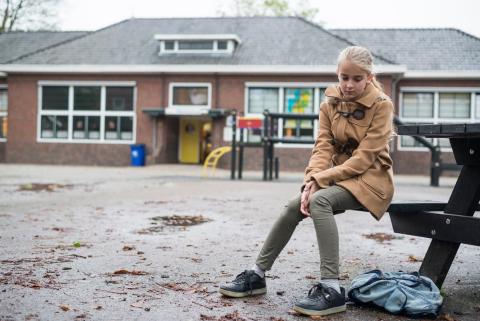If your child doesn’t want to go to school or feels unable to go to, this can be really stressful. But you’re not alone – there are many ways your child’s school can help. That’s why it’s really important to get in touch with the school and see how they can help support your child.
Your child's rights
Children have a legal right to get additional support at school if it’s needed. They also have a right to be involved in any decisions made about their education. If they’re 12 or over, they also have the right to ask for support themselves. You can help them with this, and if they’re aged 12-15 they can also get help from a service called My Rights, My Say.
What can schools do to help?
Your child has a right to additional support for learning if they need it. So if they’re refusing to go into school, there are lots of things their school can do to support them to go back in, including:
- helping you explore why your child is avoiding school
- providing a ‘safe space’ or ‘quiet spot’ for them in school
- finding them a trusted adult in school who can help them feel safe
- giving them choices and a sense of being able to leave a class if they feel very worried
- pairing them with a buddy or mentor who can help them through the day
- allowing them to start their school day earlier and/or later, to avoid the busy rush at the beginning and end of the day
- making plans with them for more unstructured periods like lunch breaks
- ensuring their teachers know how to spot the signs that they’re anxious
- talking to you about how you can help calm your child down at home and doing similar things in school
- getting help from an educational psychologist or another professional in school who may be able to help or give advice
- referring you to other sources of support in your area.
You can find out more about what schools can do to support pupils’ mental health on the Enquire website.
Contacting the school
The first thing to do is to ask for a meeting with your child’s class or form teacher, their pastoral guidance teacher or the head of year. If you had a difficult experience with school yourself, this may seem daunting. You might also be worried about being ‘that parent’ who’s always phoning the school.
But try to remember, the school is there to support your child and wants you to be involved in their education – they are actually legally required to encourage it. So by talking to the school about your child’s situation, you’re doing the best thing for your child and supporting their wellbeing. Advocate for your child as you feel able.
Tips for getting the most out of a meeting with the school
Tip #1: Be prepared
Before the meeting, make notes of everything you want to say. What do you want the school to understand about your child’s situation? It’s important that your child feels they’re part of the process too, so talk to them about how they feel and what they’d like the school to know. Depending on the age of the child (for example, if they’re secondary school age) they may also want to be involved in this process. This can help them feel more in control and less anxious about decisions being made.
The more the school knows about what your child is going through, the more they can do to help.
To help with this, you could try talking through everything with a friend beforehand and making notes as you chat.
Tip #2: Get some support
If you feel nervous about the meeting, you could ask a friend or family member to come to the meeting with you. You could also ask someone from a voluntary organisation or a professional who works with your child.
If you don’t feel confident speaking at the meeting you could also ask someone from a voluntary organisation to speak on your behalf – this is known as ‘advocacy’.
If you feel you need some support or advocacy but aren’t sure where to turn, get in touch with Enquire – they can direct you to organisations in your area who can help.
Tip #3: Bring a photo of your child with you
If your child is younger or not with you, taking a photo of them will help everyone in the meeting keep focused on the most important thing: doing the best thing for your child.
Tip #4: Don’t be afraid to ask questions
If anyone says something you don’t understand, ask them to explain. For example, they might use abbreviations, like ASL (additional support for learning) or CAMHS (Children and Adolescent Mental Health Services), which can be really confusing.
Tip #5: Take notes
It’s a good idea to make notes during the meeting, so you can remember everything you discuss. In particular, write down any actions or plans that you agree on. You could also email the school afterwards listing the actions, so you and the school have everything in writing.
If a friend is supporting you, they could take notes for you.
Tip #6: Work together
You may well feel upset and frustrated by the situation, but try to work with the school to come up with a plan to help your child together. You know your child best, but the school are also experts on education, so try and keep an open mind to things they suggest.
Tip #7: Keep your child in the loop
Make sure your child know what’s happening and doesn’t feel that decisions are being made about them behind their back. Explain to them what you and the school have discussed and ask them how they feel about this. Take them with you if they are old enough and feel able to do this.
Tip #8: It's okay to be upset
It’s totally normal to feel emotional or upset, so if you feel yourself getting overwhelmed or wound up it’s fine to ask for a wee break.
Tip #9: Check back
Arrange a time when you’ll check back in with the school, to see how things are progressing.
Tip #10: Try to be patient
It’s unlikely that things will change overnight, but try to be patient with your child and the school as plans are put in place. Sometimes it may seem as if you’re taking one step forward and two steps back, but with the support of the school things should get better over time.
What if I’m not happy with the way the school deals with the situation?
If you’re not happy with the way the school handles the situation, you may decide to make a formal complaint. The school should have a complaints process, or you can write to the headteacher. If this still doesn’t solve the problem, you may wish to take your complaint further, to the parent council or local authority. Or you may be able to get a mediator to work with you and the school to solve the problem. You can find out more about what to do on the Enquire website.
 Activities & Play
Activities & Play Behaviour
Behaviour Childcare
Childcare Development & Growing Up
Development & Growing Up Family, Friends & Relationships
Family, Friends & Relationships Feeding Your Baby
Feeding Your Baby Food & Eating
Food & Eating Health & Safety
Health & Safety Mental Health & Wellbeing
Mental Health & Wellbeing Money & Work
Money & Work Online Behaviour & Safety
Online Behaviour & Safety Pregnancy & First Days
Pregnancy & First Days School & Education
School & Education Sleep
Sleep








 Online Behaviour & Safety
Online Behaviour & Safety
 Mental Health & Wellbeing
Mental Health & Wellbeing